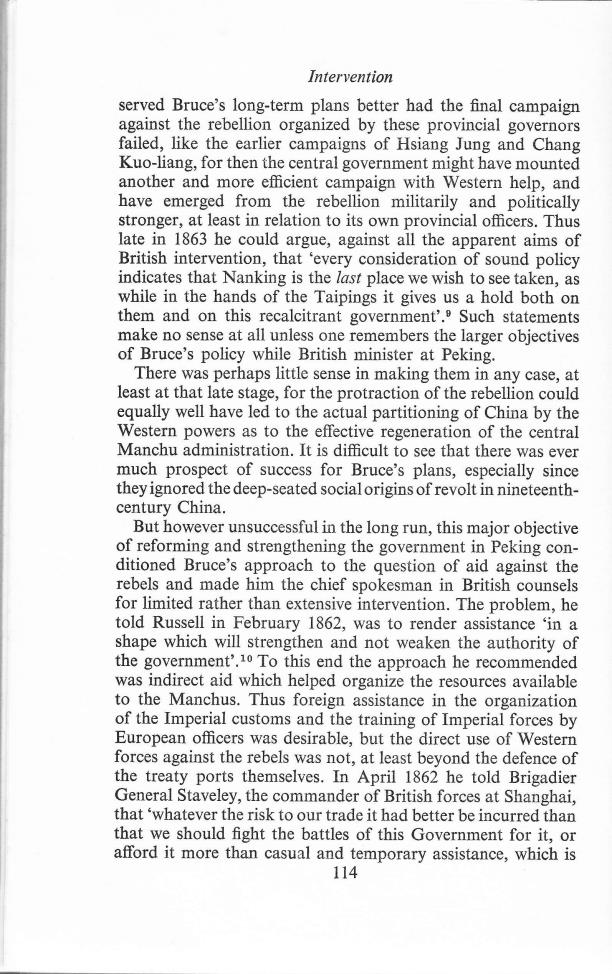正在加载图片...

Intervention served Bruce's long-term plans better had the final campaign against the rebellion organized by these provincial governors failed,like the earlier campaigns of Hsiang Jung and Chang Kuo-liang,for then the central government might have mounted another and more efficient campaign with Western help,and have emerged from the rebellion militarily and politically stronger,at least in relation to its own provincial officers.Thus late in 1863 he could argue,against all the apparent aims of British intervention,that 'every consideration of sound policy indicates that Nanking is the last place we wish to see taken,as while in the hands of the Taipings it gives us a hold both on them and on this recalcitrant government'.Such statements make no sense at all unless one remembers the larger objectives of Bruce's policy while British minister at Peking. There was perhaps little sense in making them in any case,at least at that late stage,for the protraction of the rebellion could equally well have led to the actual partitioning of China by the Western powers as to the effective regeneration of the central Manchu administration.It is difficult to see that there was ever much prospect of success for Bruce's plans,especially since they ignored the deep-seated socialorigins of revolt in nineteenth- century China. But however unsuccessful in the long run,this major objective of reforming and strengthening the government in Peking con- ditioned Bruce's approach to the question of aid against the rebels and made him the chief spokesman in British counsels for limited rather than extensive intervention.The problem,he told Russell in February 1862,was to render assistance 'in a shape which will strengthen and not weaken the authority of the government'.10 To this end the approach he recommended was indirect aid which helped organize the resources available to the Manchus.Thus foreign assistance in the organization of the Imperial customs and the training of Imperial forces by European officers was desirable,but the direct use of Western forces against the rebels was not,at least beyond the defence of the treaty ports themselves.In April 1862 he told Brigadier General Staveley,the commander of British forces at Shanghai, that whatever the risk to our trade it had better be incurred than that we should fight the battles of this Government for it,or afford it more than casual and temporary assistance,which is 114姒rcrv召 P9莎 :o刀 serVed Bruce’ s1ongˉ term plano better had伍e flna1campaign against the rebe11ion organized by these proⅤ inoa1goⅤernors n吐led,1ike the earlier campaigns of Hsiang Jung and Chang KuoˉⅡang,for then the centra1gover【 ltnent mi£ 查tRt have motI【 lted another and more e盥 cient campaign Ⅵ砬u1`a`estern he1p, and have emerged from the rebellon mil⒒ arily and po1it妃 aⅡy stronger,at least in re1ation to its own provincial o£ I1cers。 Thus late in 1863he could argue,against aI1the apparent ahⅡ s of BⅡtish L1tervention,that‘ every consideration of sound po1icy indicates that Nankij〔 1g is the`砑 s莎 place we、〃ish to see taken,as whⅡc in the hands of the Taipings it gives us a hold both on them and on this recalcitrant government’ 。9 Such statements make no sense at a1l uⅡ less one remembers the1arger o砀 eCt加es of Bruce’ s poⅡcy wh⒒e Briush nⅡ nister at Peking. There、Ⅴas perhaps1ittle sense in rnaking the狃 in any case,at 1east at that late stage,for the protraGu。 n。f the rebe11ion could equally weⅡ have led to the actual part止 ionhg of C妯 na by the Western powers as to the efFective regeneration of the central Manchu admirlistration.It is di】 11cu1t to see that there was ever mu0h prospect of success for Bruce’ s p1ans, espeoa11y since theyignored thedeepˉ scatedsocIaloriginsofreⅤ o1tin nineteenthˉ century Cbina。 But howevcr unsucGessfL11h the1ong run,th恕 m苟or o旬ect卜e of refor1r1i11g and strengthening the government in Peking cO【 l~ d⒒ioned Bruce’s approaGh t。 the question of aid agahst the rebe1s and made hi1n the c⒒ ief spokes1nan in British counse1s for liInited rather than extensiⅤ e intervention。 The proble【 n,he to1d Russe11in February 1862,was to render assistance‘ in a shape which Ⅵ泛11strengthen and not weaken the authority of 伍e government’ ,10To this end the approach he recomlnended was indirect aid which heIped organize the resources availabIe to 伍e Manchus。 Thus foreign assista且 Ge in the organizatio【 l of the Imperial customs and the traⅡ 1iⅡ g of Imperial forces by European o扭 cers was desirable,but the direct use of Western forces against the rebe1s llzas no△ at least beyond the defence of the treaty ports themseIves。 In AprⅡ I862hc to1d Brigadier General staveley,the cO1n1nander of B茧 tish forces at Shanghai, that‘whatever the risk to our tradc it had better be incurred than that we should nght the battles of tⅡ s Government for⒒ ,or aford it more than casua1and temporary assistance,which is 114